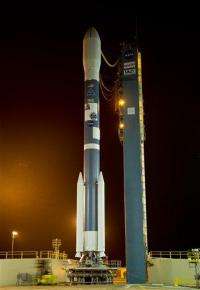Ocean science satellite blasts off from California

A rocket carrying an Earth-observing satellite launched early Friday on a mission to measure the saltiness of the ocean from space.
The Delta 2 rocket blasted off shortly before 7:30 a.m. PDT under cloudy skies from Vandenberg Air Force Base. The rocket and its international payload roared from the Central California coast southwestward over the Pacific as it climbed toward space.
Ground controllers cheered and clapped after the Argentine-built satellite carrying a NASA instrument reached orbit and unfurled its solar panels about an hour after liftoff.
"The team is jubilant," said NASA launch director Omar Baez.
The launch was delayed by a day so that engineers could review issues with the rocket's flight plan.
NASA's Aquarius instrument will measure the concentration of dissolved salt at the sea surface. The amount of brine in the ocean remains mostly unchanged, but salt levels in the uppermost layer vary around the globe.
NASA will produce monthly maps detailing changes in salt levels over three years. Scientists hope the data will help them better predict future climate change and short-term climate phenomena such as El Nino and La Nina.
Besides Aquarius, seven other instruments will collect environmental data including a camera that will make images of volcanic eruptions, wildfires and nighttime light.
The $400 million mission is a joint venture between NASA and Argentina's space agency CONAE. Other countries participating in the project include Brazil, Canada, France and Italy.
Aquarius joins a European satellite that has been gathering data on both sea salt and soil moisture since 2009. Unlike the European mission, Aquarius will focus only on the ocean.
The launch was the first of five that United Launch Alliance, the joint venture of rocket builders Lockheed Martin Corp. and Boeing Co., will carry out for NASA this year.
The other NASA missions that will ride aboard ULA rockets include the Juno spacecraft to Jupiter, the Grail probe to the moon, the NPP environmental satellite and the Mars Science Laboratory to the Martian surface.
More information: Mission information: http://aquarius.nasa.gov/
©2011 The Associated Press. All rights reserved. This material may not be published, broadcast, rewritten or redistributed.




















